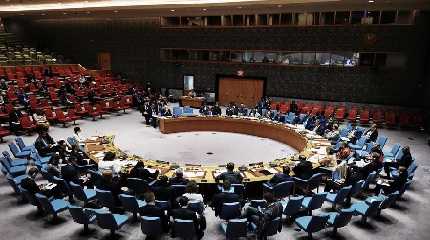
UNITED NATIONS, Mar 19 (APP): Making a strong case against creating new permanent seats on the United Nations Security Council, Pakistan had said an increase in the number of non-permanent members would make the 15-member body more representative and democratic.
“It is our long-held and principled view that the already exclusive and elitist culture of the Council – with proceedings mostly directed by its permanent members – can be changed, not by seating additional permanent members on the Council but by enhancing its representativeness, openness and inclusive decision making through an expansion and empowerment of its ‘elected’ non-permanent members,” Ambassador Munir Akram told delegates in the long-running Inter-Governmental Negotiations aimed at reforming the Council.
Full-scale negotiations to restructure the Security Council began in the General Assembly in February 2009 on five key areas — the categories of membership, the question of veto, regional representation, size of an enlarged Security Council, and working methods of the council and its relationship with the General Assembly.
But progress towards the objective of enlarging the Council remains blocked as India, Brazil, Germany and Japan — known as the Group of Four — push for permanent seats, while the Italy/Pakistan-led Uniting for Consensus (UfC) group firmly opposes any additional permanent members.
As a compromise, UfC has proposed a new category of members — not permanent members — with longer duration in terms and a possibility to get re-elected once.
At the regular noon briefing on Friday, Paulina Kubiak, a spokesperson of the United Nations General Assembly President, Abdullah Shahid, said the president met with the co-chairs of the Intergovernmental Negotiations on Security Council reform — Permanent Representative of Qatar, Alya Ahmed Saif Al-Thani and Permanent Representative of Denmark, Martin Bille Hermann — apparently to make an assessment of the deadlock talks.
In his remarks, Ambassador Akram said, as a member of UfC, Pakistan supports the expansion of the Security Council to 26 members, with the addition of 11 new non-permanent members.
The addition of 11 non-permanent members, the Pakistani envoy said, will enhance the prospects of “equitable representation” for all member states on the Council, making it more representative, democratic, transparent, and accountable, with a significant positive impact on its working methods.
Moreover, he said, the addition of non-permanent members only will serve to balance the influence of the permanent members and add dynamism to the work of the Security Council. Indeed, as has been said, almost all major improvements to the Council’s work have emanated from its non-permanent members.
The Security Council is currently composed of five permanent members — Britain, China, France, Russia and the United States, and 10 non-permanent members that are elected in groups of five to two-year terms.
Ambassador Akram also said the UfC stands for enhancing the transparency and inclusivity of the Council deliberations; reform of the “penholder” system; transparency in the appointment of chairs of subsidiary bodies; enhanced access and participation of non-Council members; enhanced information exchange and out-reach related to the Council’s work through the respective Council Presidencies; enhancing the transparency of the UNSC sanctions regimes by further strengthening the office and role of the Ombudsperson to the Da’esh and Al-Qaeda Sanctions Committee, as well as by making appropriate changes to end the inherent discrimination against and targeting of certain groups, in particular Muslims, under the Council’s sanctions regimes.
The Pakistani envoy also underscored the need to uphold and respect the General Assembly’s role as the principal deliberative, policy making and norm setting organ of the United Nations.
“We should all be seriously concerned at the continuing encroachment by the Security Council on the functions and powers of the General Assembly, in particular by attempting to set legal norms and establish definitions for various issues that are squarely within the purview of the UN General Assembly,” Ambassador Akram said.
In particular, he called for preventing the “mainstreaming” of a number of opaque and non-inclusive processes aimed at transferring exclusively determined “soft law” standards and practices into hard law through the use of Chapter VII (enforcement) resolutions and decisions of the Council, bypassing the General Assembly’s prerogatives to build norms and standards through inclusive negotiating processes and with the representation of the views and interests of the entire UN membership.




